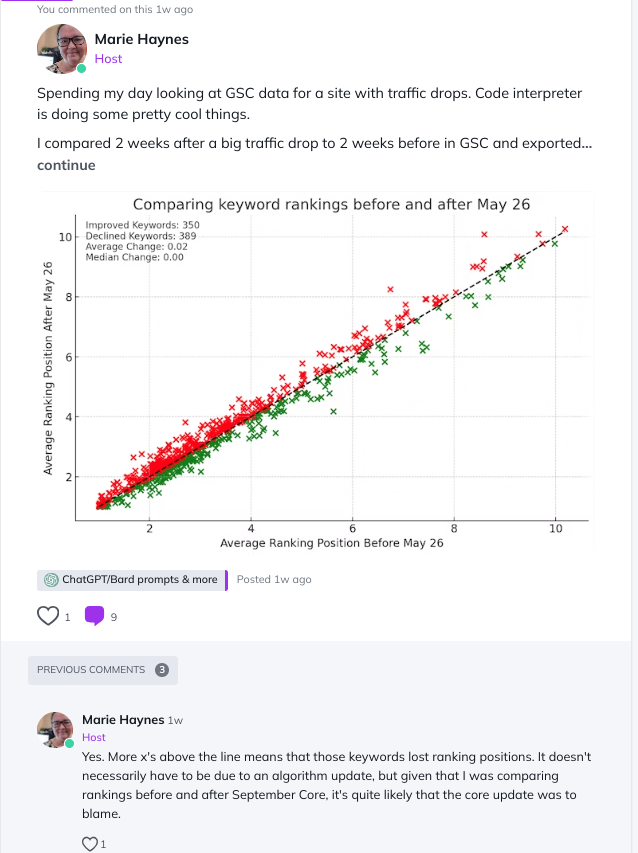SEO and AI News - What we know of the August core update so far | Episode 301. Aug 28, 2023
Last week’s episode (300) See all episodes Subscriber Content
After months of waiting, we finally have another core update! So far, we have not seen much movement, but it is early. In this episode I’ve shared what we are seeing so far as well as answered some questions I’ve been asked about core updates recently.
This week’s Search off the Record podcast was all about Google updates. I’ve shared my notes. There are some GA4 tips including how to see organic visits to a particular URL and how to compare hourly sessions which is handy while an update is rolling out! I’ve shared a bunch of recent SGE screenshots. The ones that show it answering recent news queries are interesting. And as always, I’ve covered the most recent and interesting AI news.
Subscriber content
In the subscriber content this week:
- Did you know that the “helpful content questions” originated as Panda questions?
- Main content – it’s not what I originally thought. I’ve written a fair amount about a revelation I had about what the QRG says about “main content.” This is incredibly important.
Not able to subscribe? You’ll still learn lots each week in newsletter. Sign up to the free version using this form so I can send you an email each week when it’s ready:
SEO News
Google’s August 2023 Core update is live
Finally! The previous core update was in March. The August Core update started rolling out August 22, 2023. We are hearing a bit of news about sites being affected, but so far not a lot has been reported.
This will be a tricky update to analyze because for many sites, GA3 has stopped sending data, and for quite a few, GA4 is not set up.
What the industry is seeing so far
It’s incredibly early to do any sort of analysis, but here is what we are seeing so far.
Here is a health site I’ve been advising. They’ve been working on improving content quality and appear to be seeing nice improvements so far with this update. I hope to be able to discuss this site more. I’m chatting with them this week, so stay tuned.

Here is another health site. I haven’t consulted with these folks recently, but I know they are working continually on improving quality and E-E-A-T. Again, hopefully I will be able to dig in deeper and share more soon.
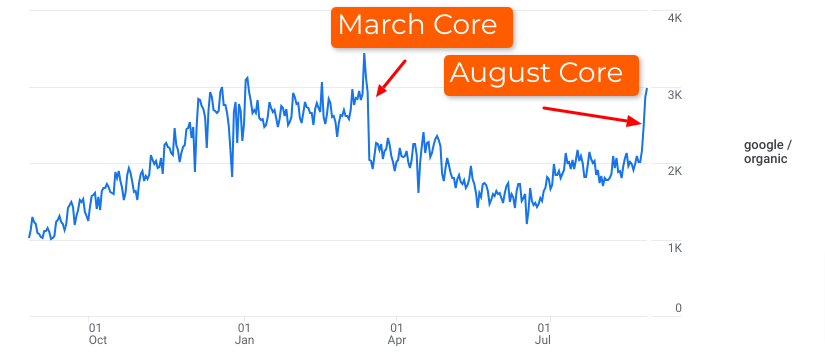
It can apparently take up to 3 days for GA4 data to be accurate. I have some sites showing complete drops of traffic down to zero. But, I think this is because of GA4’s reporting. I will share more next week.
You should avoid analyzing the #GA4 data until the full three days have elapsed. That means no data analysis for today and the last two days. And real-time reporting and analysis are simply out of the question.
.
.
In GA4, events are processed even if they arrive up to 72 hours… pic.twitter.com/f0cGMaJoSP— Himanshu Sharma (@analyticsnerd) August 25, 2023
Lily Ray reported several big news sites and product review sites seeing big gains. These images show Sistrix’s visibility index.
Some super early core update movement.
Looks like several big news sites (Axios & the Nation) & product review sites (Find This Best, Expert Reviews UK) are seeing visibility gains. pic.twitter.com/kTDVwsYmIU
— Lily Ray 😏 (@lilyraynyc) August 25, 2023
Most are seeing little movement related to the core update so far.
UK has been wild for quite a few days last week, then settled. No major movements I've noticed yet.
— Azeem Ahmad (@AzeemDigital) August 25, 2023
Some things to know about core updates
If being impacted by a core update is new to you, here are some questions that I am commonly asked.
Will you see the impact of a core update right away?
In most cases, the brunt of the impact is felt in the first 2 days. However, some updates have behaved differently. For the September 2022 core update, there were several sites I analyzed that I felt were impacted in the midst of the rollout.
But, in most cases when I’m looking at historical traffic of a site impacted by a core update, it’s really obvious that they were impacted at the start. Here is a site strongly impacted by March 2023 core.

It’s not always such a sudden steep decline in one day. Usually you can tell that the decline started on the day of the update being announced and sometimes the decline is gradual. Here is another site impacted by the March core update on March 15, 2023.

If affected, is it a penalty?
No. It’s not because of unnatural links or other spam tactics. If you suffered losses it’s because Google’s algorithms have changed and they now find other people’s content more likely to be a good fit for searchers than yours.

If impacted, what do you do to recover?
Recovery can happen, but in most cases you need to wait until Google runs another core update to see significant improvement. There is no one specific change that you can make that will help you improve.
For several years my advice on recovery centered around E-A-T (now E-E-A-T). Although I still do recommend many E-E-A-T related changes like adding or improving author bios, SameAs schema, improving use of references, getting more authoritative mentions and so on, today this is not what moves the needle. Most sites that have rankings to lose, by now have done a good job at establishing and communicating their E-E-A-T.
In most cases, what it takes to recover from losses following a core update is a dramatic improvement in content across the site to make it truly helpful to searchers. I recommend looking at the content that Google has elevated above you and asking yourself, why would this better meet the immediate need of the searcher? It’s tempting to look at the search results and think that Google has messed up. Because often the pages Google are elevating look like low quality to an SEO. But, it is incredible how often I look at these pages that many would call spammy and go, “Oh wow, this page actually answers the user’s question much more concisely.”
Some would say, “But wait – don’t the helpful content questions ask whether content is comprehensive and complete?” It’s important to think of the searcher’s need. If a searcher coming to your page is likely to want to read a thorough article on a subject, then by all means write a thorough one! But in many cases, that’s not the searcher’s need.
In the subscriber content I share more about understanding the needs of a searcher and making sure that your “main content” is easy to find and addresses that need.
The most important helpful content question in my opinion is this:
- Does the content provide substantial value when compared to other pages in search results?
If impacted is it because of bad links?
Core updates are not about link quality. Unnatural links are assessed by the Spam system, not core updates. I do think that sometimes sites that have used a lot of link building can see declines with core updates but it’s not because of the links. Rather, as Google gets better at using AI to determine which content is relevant and helpful, they can rely less and less on links as a signal.
Every time there is a core update I get requests for help from people who have looked at their links, seen a lot of odd spammy looking ones, and think they are the victim of negative SEO. This is very unlikely to be the case. For more:
Toxic links: Here’s why you can often ignore them
Toxic links and disavows: A comprehensive SEO guide
What should I be doing during this rollout?
There’s nothing you can do to change what is about to happen to your rankings. If it looks like you’ve been negatively impacted by this update, those decisions have already been made. Yes, you should be improving your content, (my helpful content workbook will help with that), but changes you make now will be assessed by the next core update.
Core updates tend to happen a few times a year. The last few have been:
- March 15, 2023
- September 12, 2022
- May 25, 2022
Could the changes be reversed?
Any time there is a significant change in Google’s algorithms, there will be what I call “turbulence” – lots of shifts in rankings. However, Google does not tend to roll back updates. If your traffic is down slightly, it may be just normal ranking changes. If your traffic is down a lot and it’s due to the core update, it means that Google’s algorithms have changed to find competitors’ content more helpful and relevant than yours. Those changes will likely stick.
You can see some improvements with quality changes that you make before the next rollout. But a full recovery is uncommon until the next one happens.
Join us at the Search Bar?
Search off the record podcast on updates
This was so good. Here are my notes. This is a Marie summary, not Claude:
- The “Google algorithm” is actually multiple systems that come into play.
- Last year Google changed their verbiage to talk about “ranking systems” rather than updates.
- An “update” really means that a system Google uses has been reworked or improved in a way that will provide better results.
- Google recently added a new system for News sites to measure topic authority. They’ll be creating a new page to describe that soon.
- Danny says no one could ever possibly try to reverse engineer a ranking system. Instead focus on building the best content you can, helpful, people first content.
- Page Experience is not all about Core Web Vitals. Can involve interstitials, popups – or “what you’re doing with how you’ve formatted the page overall.” “Think about it in terms of what a user might encounter, a person, a human being coming to this page, might encounter.”
- It’s not like you need author bios, doctors, etc. But, if you do have those things, “You’re probably aligning with these other signals that we have that help us measure whether or not content seems to be useful.”
- Users might look at content and think “This content really wasn’t designed for me, it was designed to just rank in a search engine.” That’s not what Google wants to rank. You want users to say, “Oh, this is actually a helpful site.”
- (I’m capitalizing this part because it’s so good.) PUT YOURSELF IN THE SHOES OF SOMEONE WHO ARRIVES AT THAT CONTENT AND WHAT THEY’RE GOING TO BE THINKING ABOUT.
- Example given of a travel site. It starts with “Whenever you go, the sun is shining and…” Danny says, all he wants to know is where to park, how do you get there, how long do you need to be there, and that you’ve actually been there. Stop writing extra words because you think Google wants them.
- Martin says it all boils down to – are you doing SEO so that a hypothetical search engine system might pick up the page? Or are you trying to make something for your users?
John, ‘I think now more than ever, having that authentic content that you created because you have an actual audience in mind that you know would come to it directly, that is your way forward.”
A page doesn’t have to be top 10 to win a featured snippet
John Mueller said that there’s no rule saying a page has to be in the top 10 to be chosen for a featured snippet.
GA4 info
GA3 has stopped processing data for many sites
Many people got this notification this week. What bad timing…right before the core update when so many site owners will be desperately trying to figure out what happened to their traffic.

How to create a report with chart showing organic visits to a URL in GA4
Dana DiTomaso made this tutorial:
GA4 course
Speaking of Dana, I highly recommend her Analytics for Agencies course. You can use this link for 10% off should you decide to purchase.
How to compare hourly sessions in GA4
This is great advice from Glenn Gabe.
Google can now index CSV files
Barry Schwartz noticed a change in Google’s documentation and John Mueller confirmed that yes, this is new.
New new, not just new doc :).
— John 🧀 … 🧀 (@JohnMu) August 25, 2023
This new Ahrefs feature looks helpful.
NEW: Open in Overview 2.0 in SERP Overview 🚪
Compare search results and competing domains directly on the history graph in Overview 2.0.
See it in action below 😎 pic.twitter.com/xErohzlIns
— Ahrefs (@ahrefs) August 16, 2023
AI News
SGE
Andy Simpson pointed out new dropdown links in the SGE local results. Click the down arrow and new information appears. (I think this is information from their reviews, although it’s hard to tell.) Apologies for image quality – you can click the link to see it in the tweet as it’s a gif and didn’t screenshot well.

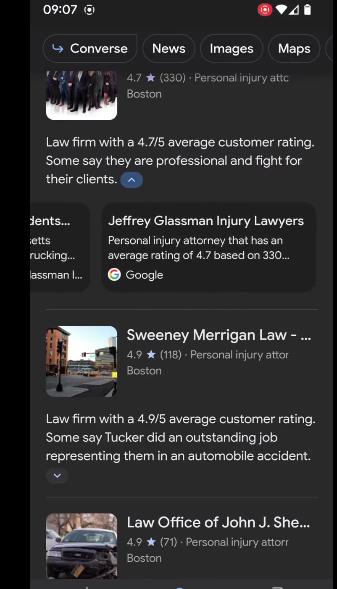
Jake Bohall shared this example of SGE while browsing.

Lily Ray shared an SGE video example that shows why SGE is a concern for news sites. Here it is synthesizing information on news almost as it happens.

Here is another example showing recent news.

Lily also shared SGE connecting to Merchant Center.
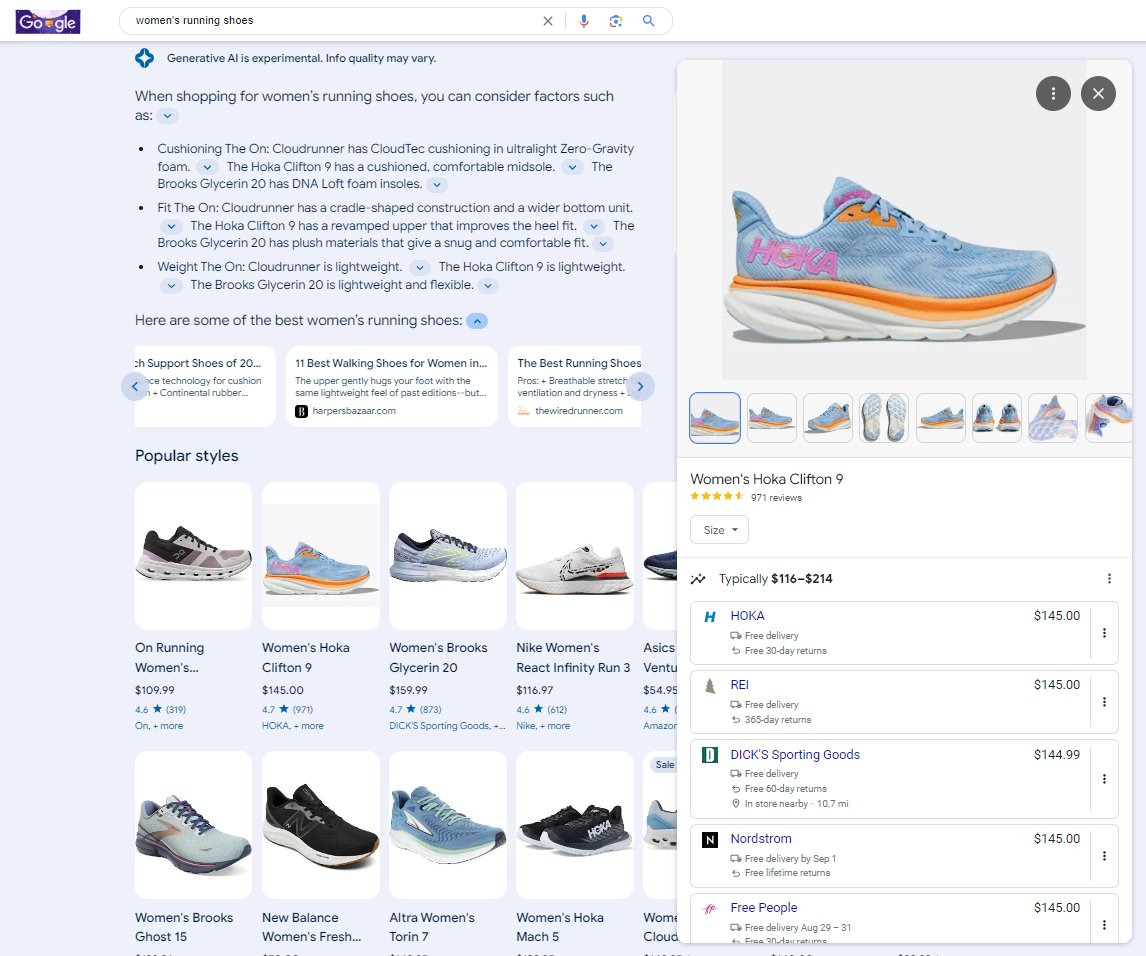
Lily was quoted several times in this Gizmodo article discussing how SGE is sometimes giving horrible answers for queries like, “benefits of slavery” or “best jews”. These are serious issues that Google will need to resolve before SGE goes fully live. Lily did point out that Bing chat has already done well in this area, so improvement is possible.
Jared Bauman shared an example of how SGE struggles sometimes with queries with mixed intent. This is an interesting one. Part of the answer refers to Jared’s brand. The rest refers to a general concept. Yet, they’re presented together as one concept.

Remember how Sundar Pichai said that user feedback on SGE has been overwhelmingly positive? While the majority of the SEO community is not a fan of SGE, I am seeing some people say they like it.
It's been in beta for about a month, can't see myself without it now. Although I still use perplexity for stuff pretty regularly
— James Patton (@jpattondesign) August 25, 2023
More AI info
YouTube has talked with AI experts and leaders in the music industry to help the industry embrace AI technology, but also protect the creative work of artists.
YouTube also has a new experiment to allow you to hum a song and it will use AI to identify it. (Much like we have seen with Google Assistant.)
OpenAI and Scale are joining forces to help more companies benefit from fine-tuning OpenAI’s models. Fine tuning refers to taking a pre-trained model and adapting it to work better for your particular tasks.
This is huge. 🦾
OpenAI says you can now fine-tune ChatGPT.
Generations cost 8x as much from fine-tuned models though.
If you're not familiar, fine-tuning is a special process that allows you to hone the kinds of output you get from a language model.
It's how to make and AI…
— Rob Lennon 🗯 | AI Whisperer (@thatroblennon) August 22, 2023
Meta has released Code Llama, an AI model built on top of Llama 2 that is specialized for coding tasks like generating code, code completion, and debugging, and is releasing it for free research and commercial use.
Google announced new security features, powered by Google AI to help organizations keep workplace data safe. Zero trust capabilities like automatic data classification, enhanced data loss prevention, and mandatory 2-factor authentication for admins aim to provide more granular controls over data access and prevent threats.
LinkedIn implemented large sparse ID embeddings, scaling up its AI models and infrastructure, in order to provide a more personalized and relevant homepage feed experience for each user. Now, instead of generic content, users will see posts, articles, discussions, and job opportunities tailored to their unique professional interests and preferences based on their industry, skills, connections, and platform activity.
LinkedIn is also doing something called collaborative articles, inviting a “select group of experts” to contribute insight. They say they identify members who are likely to be experts in a certain topic. To be considered, you need to engage with the articles by liking or reacting to them.
The UK government is investing up to £100 million to procure thousands of high-powered AI chips. These will provide the backbone for the national AI Research Resource that will support UK researchers and companies innovating with AI.
New Google paper: Teaching language models to reason algorithmically. Large Language models can perform simple arithmetic operations when numbers are small but struggle with large numbers. This paper discusses using algorithmic prompting to teach language models the underlying rules of arithmetic, enabling them to better generalize to more complex math problems.
Google’s DeepMind has given us a bunch of images and visualizations we can use when talking about AI. The idea is to get away from the picture of AI being like a scary Terminator movie.
At least 69,000 websites are already blocking GPT bot.
Other interesting industry info
Elon Musk says that Twitter/X plans to strip out the headline of news stories shared. Wow.
I think I understand why. I have noticed is that often the heading of a post is written in a way that is more sensational than what the real story is. These headlines can often shape public perception.
This is coming from me directly. Will greatly improve the esthetics.
— Elon Musk (@elonmusk) August 22, 2023
On a related note, Digiday reports that referral traffic from X is declining sharply for many news publishers. For some sites like the Washington Post or the New York Times, X started implementing a 5 second delay for links from the platform.
Semrush’s SERP snapshots are having an issue where all they show is eBay.
This is unreal. You can apparently scale demonstrating experience:
Social selling factory in Indonesia 🤯
This is UGC industrial mass production. This is a freaking factory.
Selling things online is changing so fast. Everything is changing so fast.
This is unreal pic.twitter.com/8rig77MGuR
— Linus ●ᴗ● Ekenstam (@LinusEkenstam) August 20, 2023
Great content published this week
In the subscriber content I’ve summarized these articles. They are all worth a read!
How To Build A Future-Proofed SEO Strategy When AI Is Changing SEO – Kevin Indig on SEJ
5 top tips to boost your local SEO efforts – Erin Jones on SEL
What Diners Write About Most: A Study of Restaurant Review Place Topics – Miriam Ellis on Moz
Quello che conta? La SEO. Il portale che sparisce da Google – Elisa Paesante on Sistrix
Why Real Expertise is the Most Important Ranking Factor of Them All [MozCon 2022] — Lily Ray
Local SEO
Some are seeing a new feature where the map for local searches auto-expands across the SERP.
Google local pack map auto-expand feature seems to now be rolling out after months of testing https://t.co/94m8UVZzX1 hat tip @mblumenthal and @robertlspinrad pic.twitter.com/zGHc64cpCC
— Barry Schwartz (@rustybrick) August 24, 2023
Your GBP attributes appear in Google Pay now. Reported by Allie Margeson.
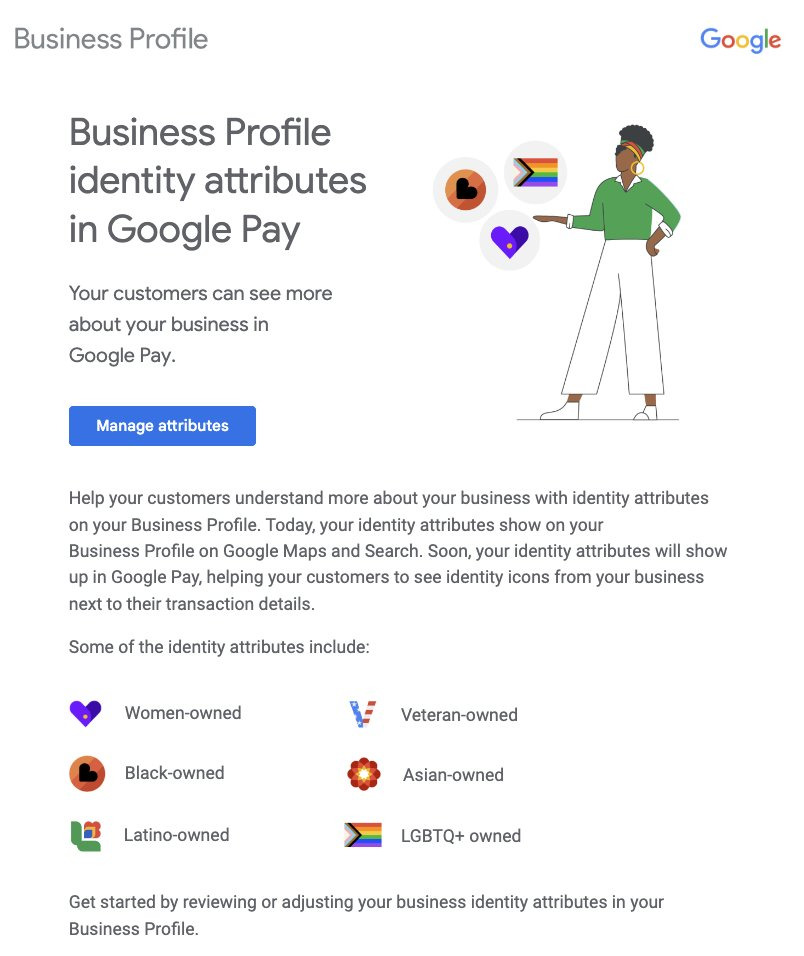
Jobs

Looking for a new SEO job? SEOjobs.com is a job board curated by real SEOs for SEOs. Take a look at five of the hottest SEO job listing this week (below) and sign up for the weekly job listing email only available at SEOjobs.com.
Sr. SEO Strategist ~ Corra ~ $115k ~ Remote (US)
SEO Manager ~ Alma ~ $105k-$135k ~ Remote (US)
Subscriber Content
This week’s subscriber content is one of my favourites so far.
We discuss how the Panda questions given to us in 2011 shape the algorithm today. But more importantly, I’ve written a bunch on a revelation I had about what the QRG says about Main content.

Next week in the subscriber content I’m going to discuss this Google patent on Information gain. I dug into it this weekend while working on a client report and realized that this may be the most important patent I’ve read in a long time. I’m rewriting both of my upcoming talks (Pubcon Austin workshop and LocalU Toronto) to focus on meeting searcher intent in your main content and adding information gain.
Not able to subscribe? You’ll still learn lots each week in the public, free version of newsletter. Sign up to the free version using this form so I can send you an email each week when it’s ready:
Hope you’ve enjoyed this episode. I really enjoyed writing it!
Marie


